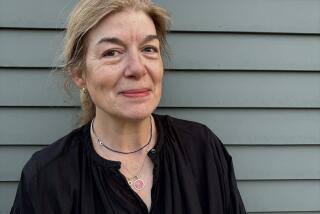An Inane and Unfocused Second Coming
- Share via
Pick an ultra-timely topic: How about the millennium? Find yourself a barn-door-sized target, preferably one that won’t offend canons of political correctness: say, a Christian extremist sect. Better yet, just to be really sure it’s a target most everyone can cheerfully hate, make it a racist Christian extremist sect. Now throw in a few more sure-fire hot topics: body-piercing, tattoos, Bosnian refugees, nuns, religious mysticism, cyberspace, game shows and, of course, it being the year 2000, the Second Coming. But, hey, this time around, what if the messiah were a woman? Better yet, two women: one a tattooed, pierced, spunky girl from New Orleans; the other an incredibly sexy, multilingual Bosnian Muslim war orphan.
Mix it all together and what have you got? Ninety-nine times out of 100, an unreadable novel. Andrei Codrescu’s “Messiah” proves no exception to the rule. A poet, essayist, novelist and journalist well known for his wry cultural commentary on National Public Radio, the Romanian-born Codrescu is also professor of English at Louisiana State University. Since coming to America in the 1960s, he has been churning out books at a rate exceeded only by Joyce Carol Oates.
Like Oates, Codrescu is fecund and intoxicated with language. But unlike her, he does not have a gift for telling a story or creating flesh-and-blood characters. Nonfiction rather than fiction seems to be his forte, for the ingenuity he displays in assembling a conglomeration of bizarre incidents and characters is a far cry from the true novelist’s ability to imagine a fictional world and, through his or her artistry, bring it to life.
Perhaps to atone for what some might have deemed the misogyny of his most recent foray into fiction, “The Blood Countess” (in which the violent legacy of European autocracy was embodied in the character of an eponymous female aristocrat), Codrescu now gives us not one, but two females who together will save the world. But because they do not meet up until near the end of the novel, the story keeps shifting back and forth, disconcertingly, between spunky Felicity’s adventures in New Orleans and war-orphan Andrea’s in Jerusalem.
Codrescu has crammed his novel with an eye-popping array of purportedly colorful characters, not one of them the least bit believable. This does not prevent the author from continually telling us how we are supposed to feel about them.
Felicity, though brash, is a good-hearted girl who loves her grandmother. War-orphan Andrea, we’re assured, is “both brilliant and blessed,” projecting “an unabashed carnality that waft[s] off her like attar.” The sect leader is predictably mean, “like a big cat.” This heavy-handedness, which would surely spoil a novel with any pretensions to realism, might not be enough to sink a satirical fantasy.
But although “Messiah” seems to be a satire, it lacks focus. And, although Codrescu locates his satire in the realm of fantasy, where anything is possible, he is so busy running off in every direction, it’s hard to get a handle on what’s going on.
This is not to say that there are no ideas or insights to be gathered along the way. Codrescu enthusiastically celebrates some elements of contemporary culture, like playfulness, tolerance and the pursuit of orgasms, while offering some shrewd critiques of more worrying social tendencies, putting these reflections into the mouths of his characters: “On this place,” remarks one of them, visiting a site in Jerusalem, “Hadrian ordered the erection of a statue of Venus. She stood here over the tomb of the Nazarene, encouraging the pleasures of the flesh and demanding the sacrifice of virginity. Not for long, though. Soon Rome forgot its heart, and worshiped only Fortuna. The Wheel of Fortune was their only game. . . . The empire lost its strength to soothsayers and charlatans who promised worldly wealth and happiness.”
But occasional flashes of social commentary do not make a novel, and by the time the heroines get together to magically rejuvenate the world, the reader may well be too exhausted from trying to follow the convoluted, increasingly inane plot to care whether they succeed.
Merely because a novelist’s topic is the threatened end of the world is no reason why his novel should be inchoate, as Gore Vidal’s cogent treatments of similar themes in his “Messiah” and “Kalki” amply demonstrate. Would that Codrescu had taken the trouble to concentrate on his theme rather than gawking like a dazzled tourist at the silliness of his own inventions.
More to Read
Sign up for our Book Club newsletter
Get the latest news, events and more from the Los Angeles Times Book Club, and help us get L.A. reading and talking.
You may occasionally receive promotional content from the Los Angeles Times.







